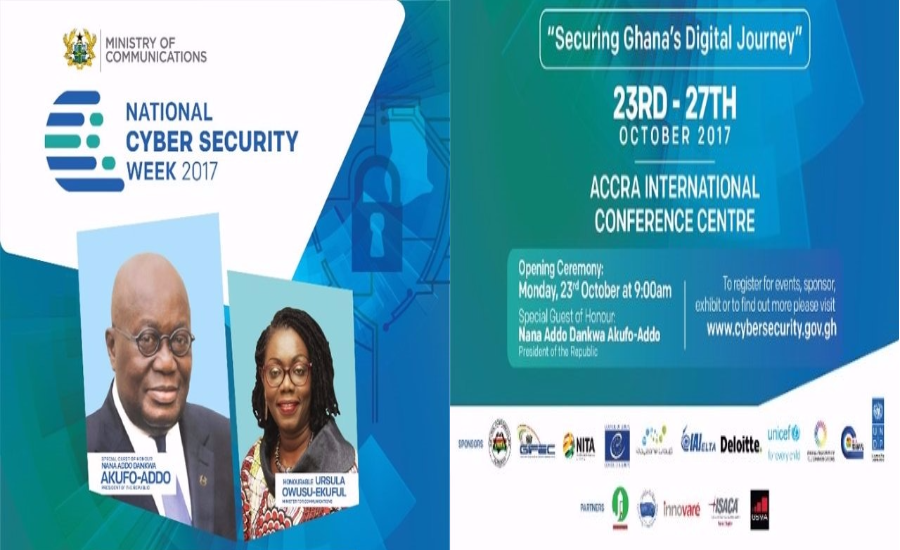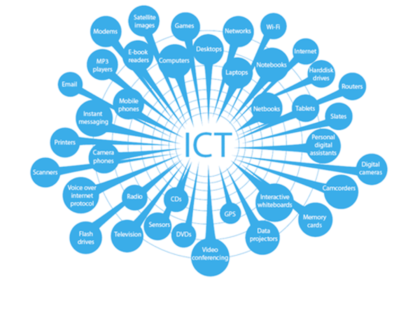Cyber Security week is an annual event which aims to raise awareness of cybercrime trends and to highlight the growing importance of cyber security at all levels—people, businesses and government. As the month of October, slated for global Cyber Security Awareness, Ghana celebrated its National Cyber Security Week 2017, organized by the Ministry of Communications, and under the distinguished patronage of the President of the Republic, His Excellency Nana Addo Dankwa Akufo-Addo, at the Accra International Conference Center, from 23rd – 27th October 2017.
The week, themed “Securing Ghana’s Digital Journey” brought together stakeholders from all walks of life to create awareness of cyber security and how to protect systems and citizens from cyber-attacks. The celebration featured an informative and engaging programme of activities including thought leadership sessions, panel discussions, demonstrations, and exhibitions.
The event was a national platform for major industry players, businesses and organizations, an opportunity to share information and experiences, and best practice with global partners, and a National visibility for cyber security solutions and innovation.
Key discussions throughout the week revolved around Cyber Security Governance; Cyber Security Conferences & Workshops; Child Online Protection; Cyber Security Solutions; Cybercrime, Cyber Hygiene and Awareness, with seasoned experts and professionals in the industry.
Key participating stakeholders also included the Ministry of Communications, the National Cyber Security Secretariat, the Ministry of National Security, Africa Union Commission, ECOWAS Secretariat, UNDP, Council of Europe, National Communications Authority, Data Protection Commission, Ghana Chamber of Telecommunications, ISACA Ghana, and Innovare.
During the President’s address at the formal opening ceremony, he noted that Cyber-security issues are now firmly national security threats, and that Ghana cannot fully reap the digital dividends, associated with her adoption of ICT as a means of our socio-economic transformation, if the country fails to mitigate both existing and emerging cyber security threats. For this reason, the need to establish a National Cyber Security Centre, as has been done in some other countries, to liaise with relevant state agencies and the private sector to oversee cyber security operations at the national level.

The president also pointed out that the government is undertaking specific policy and practical intervention initiatives (Ghana’s National Cyber Security Policy & Strategy–NCSPS), including capacity building, international co-operation, judicial enforcement of cybercrime legislations, and implementation of technical standards and safeguards to combat the menace.
His Excellency added that the government will also engage with international institutions and technology partners, such as International Telecommunication Union (ITU), the Commonwealth Telecommunications Organization (CTO), Google, Facebook and Microsoft, to ensure cyber safety for citizens, especially children.
As we scale up our digitization efforts and increasingly embrace technological advancements, it is vital to improve our cyber preparedness and security and adopt a multi stakeholder approach to achieve cyber wellness. This Cyber Security Week offers an excellent opportunity for information sharing and engagement and is a key component in building an effective and robust cyber security ecosystem in Ghana– Ursula Owusu-Ekuful (Minister for Communications).
In her statement, Ursula Owusu-Ekuful said that the immediate priority of the Ministry is to undertake a national cyber security risk assessment to identify cyber vulnerabilities and priority areas that require immediate and specific interventions. She added that the Ministry is working with the World Bank to conduct a Cyber security Capacity Maturity Model to assess the level of development of national cyber security efforts from the policy, regulatory, end-user, and other perspectives, in order to provide recommendations to government on how to enhance our cyber security readiness.
The National Cyber Security Inter-Ministerial Advisory Council (NCSIAC) was inaugurated, and would be the critical drivers of this national agenda.

Albert Antwi-Boasiako, National Cyber Security Advisor, in his statement at the event pointed five key broad objectives towards improving our country’s cyber security readiness—to develop an independent, sustainable multi-stakeholder institutional framework for Ghana’s cyber security based on international benchmarks and existing institutional arrangements; to develop our national cyber security capabilities to protect our critical infrastructures and to respond to both existing and emerging cyber threats; to support national institutions with a mandate on cybercrime/cyber security to develop their cybercrime and cyber security response capabilities, consistent with their mandates; to foster cyber security cooperation and partnerships at all levels; and to develop a culture of cyber security in Ghana and at all levels. He lamented on Ghana’s cyber security readiness, which he said, was 35 per cent according to a research conducted by International Telecommunications Union (ITU).

The week event was filled with participants from government agencies and departments, Business Managers, the private sector, civil society organizations, SMEs, infrastructure owners and operators, information security and cyber-security professionals, ethical hackers, students, and the general public.

Some members of the Institute of ICT Professionals were present to participate.






